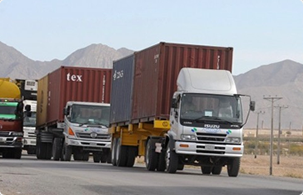Types of Logistics Services Offered in Afghanistan: A Breakdown
Afghanistan,
with its rugged terrain and strategic location, poses unique logistical
challenges. To overcome these, logistics companies in Kabul, Afghanistan, offer
a wide range of services tailored to the country's specific needs. Below is a
breakdown of the types of logistics services provided in Afghanistan.
Freight
forwarding is one of the core services offered by logistics companies in Kabul.
This service involves the coordination of shipments from one point to another,
whether by air, sea, or land. Freight forwarders in Afghanistan manage the
entire shipping process, including customs clearance, documentation, and cargo
insurance, ensuring that goods move smoothly across borders. Given the
country's landlocked geography, efficient freight forwarding is critical for
trade and commerce.
2. Customs Brokerage
Customs
procedures in Afghanistan can be complex, especially for international cargo.
Logistics companies in Kabul, Afghanistan, provide customs brokerage services
to handle the documentation and clearance processes required for imports and
exports. These services ensure that goods comply with Afghan customs
regulations, avoiding delays at border crossings and ports.
3. Warehousing
and Storage
Warehousing is
essential for companies that need to store goods before distribution or export.
Logistics companies offer secure and strategically located warehouses in Kabul
and other key cities. These warehouses often include temperature-controlled
storage for perishable items and secure facilities for high-value goods.
Efficient warehousing solutions help businesses manage inventory and ensure a
smooth supply chain.
4. Last-Mile
Delivery
The final stage
of the supply chain, last-mile delivery, involves transporting goods from a
warehouse to the end customer. In Afghanistan, where infrastructure challenges
can make transportation difficult, reliable last-mile delivery is crucial.
Logistics companies in Kabul offer specialized vehicles and teams that ensure
goods are delivered to even the most remote areas, keeping businesses connected
to their customers.
5. Project
Cargo Handling
Project cargo
refers to large, complex shipments, often for industries like construction,
oil, and gas. These projects require specialized equipment, planning, and
coordination due to the size and weight of the cargo. Logistics companies in
Afghanistan are experienced in managing such shipments, often working closely
with government agencies and international partners to ensure safe and timely
delivery.
6. Supply
Chain Management
Effective supply chain management is vital for businesses operating in Afghanistan. Logistics companies provide end-to-end supply chain solutions, from procurement and transportation to inventory management and distribution. These services help companies optimize their operations, reduce costs, and improve efficiency, allowing them to focus on their core activities.
7. Transport
Services
Afghanistan's
mountainous landscape and lack of direct sea access make land transportation
vital. Logistics companies offer a range of transport services, including road,
rail, and air transportation. Trucks are the primary mode of transport,
carrying everything from construction materials to consumer goods. For urgent
deliveries, air transport is available, although it is generally more
expensive.
8. Humanitarian
and Aid Logistics
Afghanistan
frequently receives humanitarian aid, requiring specialized logistics services
to ensure that relief supplies reach their destinations. Logistics companies in
Kabul work with non-governmental organizations (NGOs) and international
agencies to manage the transportation, warehousing, and distribution of food,
medical supplies, and other essentials during emergencies.
Conclusion
The logistics
sector in Afghanistan plays a critical role in supporting businesses,
humanitarian efforts, and trade in the region. From freight forwarding and
customs brokerage to last-mile delivery and project cargo handling, logistics
companies in Kabul, Afghanistan, offer a comprehensive range of services
tailored to the unique needs of the country. By leveraging these services,
businesses can navigate the challenges of Afghanistan's terrain and infrastructure
to ensure their goods reach their destinations efficiently.

.jpg)




Comments
Post a Comment